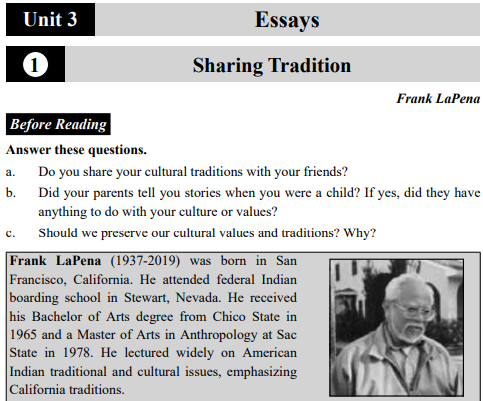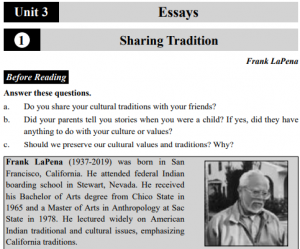Unit 3 Essay Sharing tradition
Frank LaPena
Exercise From the Book (Page: 259)
Understanding the text
Answer the following questions.
a. According to LaPena, what is the importance of the oral tradition? To what extent do you agree with his opinions and why?
Ans: According to LaPena, oral tradition is in helping maintain the values of culture, and oral tradition is also an art form. Yes, I agree with his opinion because it helps to share and transmit ancestors culture, skill and knowledge to next generation.
b. Who preserve and pass on the oral tradition?
Ans: Traditional people have dedicated their lives to preserve the oral tradition. As the guardians they want to share their knowledge of the culture. After they die, it becomes the duty of other individuals to pass the tradition to the next generation.
c. What is the danger of not passing on information from generation to generation?
Ans: The main danger is the loss of oral tradition if information is not passed on to the next generation. Young people do not pay much attention. But the writer says many people regret later for not listening to what the elders wanted to share.
d. What is the difference between oral tradition and literary tradition?
Ans: Oral tradition is a living experience. It depends on personal sharing, and all members know the oral stories. But literary tradition depends on published information from research. The source of oral tradition is more reliable and correction is also possible.
e. How does LaPena establish a relationship between art and the oral tradition?
Ans: He presents the oral tradition as the source of our inspiration for art. He says that the oral tradition has an impact on how one visualizes the stories, the characters, the designs and colour for art, the atmosphere, and other information which can be useful to an artist. Art is an abstract thing until it gets ideas from past traditions. He claims that the art gets life because it gathers materials from our past tradition and culture.
Reference the context
a. LaPena states that the oral tradition helps maintain the values of a culture. If you believe that the oral tradition is important, how would you maintain it?
Ans: LaPena states that the oral tradition helps maintain the values of a culture. Yes, the oral tradition is important, I will maintain it by following it.I will also correct and transfer it to my next generation orally. I will make next generation aware about the main danger of losing oral tradition if information is not passed on to the next generation. When I grew old, I will teach young people to give much attention to it. I will also share its’ importance. In future, I will publish a book about the oral tradition to make it available to all generations.
b. “Not everyone is capable of fulfilling the roles of the elders.” Explain this statement with reference to the essay.
Ans: LaPena states that “Not everyone is capable of fulfilling the roles of the elders.” He means that everyone becomes elder but not everyone is capable of fulfilling the roles of the elders by sharing their tradition and culture orally. LaPena makes us aware about the main danger of losing oral tradition if information is not passed on to the next generation. He thinks that young people do not pay much attention. Later on, many people regret for not listening to what the elders wanted to share. It proves that all can’t fulfill their duty as elders.
c. What is the controlling idea or thesis of this essay ‘Sharing tradition’ by Frank LaPena ?
Ans: The essay is about the need to preserve oral tradition by sharing. The writer says it is the responsibility of every generation to pass cultural values to the next. And this should be done in an authentic way without changing the contents.
d. How do topic sentences guide the reader through the essay? What would be lost without them?
Ans: Topic sentence is the very first sentence of our paragraph. Topic sentences keep our writing focused. It guides and binds the reader through your ideas, logic and argument. Essay has different paragraphs but each paragraph focuses on a single idea. Topic sentence states the main idea of the paragraph. We lose smooth transition without them. In the same way, reader loses his attention without them.
e. What are the four major problems developed by LaPena with regard to maintaining the oral tradition. How are they used to structure the essay?
Ans: The writer describes four main problems in maintaining the oral tradition. First, some elders have played ideal and special roles in preserving the values. And it is hard to fill their places. Second, the youngsters do not show enough interest in listening to and asking the elders. Third, it is hard to maintain traditions in changing times when new technologies destroy old values. The last problem is of authentic sharing. Modern research may not collect true data about the oral contents of tradition. Once wrong information is published, correction is difficult.
Reference beyond the text
a. Write a paragraph or two explaining your attitude toward the oral tradition of passing along information.
Ans: I believe that oral tradition helps to maintain the cultural values and norms. It is also an art form because art takes it’s subject matters from our tradition. The oral tradition of passing tradition from one generation to next is valuable art. I believe that it helps to share and transmit ancestors culture, skill and knowledge to next generation. Next generation gets a chance to know past culture and tradition. They will understand that our culture is our true identity. So my attitude towards the oral tradition is positive. I believe that if we lose our culture, we will lose our identity and existence. We will suffer from the problem of identity crisis. Our culture and tradition are a living experience. We must preserve, follow and transmit it from one generation to next to save it’s existence. Without it, we will lose our true identity.
b. Our culture is our identity. Write a few paragraphs explaining how you intend to preserve your culture, values and norms.
Ans: Yes, it is true that our culture is our identity. If we lose our culture, we will lose our identity and existence. We will suffer from the problem of identity crisis. Our culture and tradition are a living experience. We must preserve, follow and transmit it from one generation to next to save it’s existence. Without it, human beings will lose their true identity.
Culture plays a crucial role to shape an individual’s identity. Moral values, tradition and culture help to differentiate human beings and animals. So, it is our true identity. If a person doesn’t follow his/her culture, he/she will lose identity and value in the society. Our parents are real Gods who are transmitting us culture and values to shape our habit and behaviour. So, we must preserve it by following it.
I will correct wrong things about our culture, values and norms and transmit the right things to my next generation. I will make next generation aware about the main danger of losing culture, values and norms if information is not passed on to the next generation. When I grew old, I will teach young people to give much attention to it. I will also share its’ importance. In future, I will organize a programme for youngsters to teach and guide them about the importance of culture and values.
Culture shapes our behaviour, manner and morals. As a result, it helps to shape their identity. We know the fact that our neighbour analyzes us according to our behaviour, manner and moral. It means that we are judged in our society by our culture. So, it proves that our culture is our true identity. We should not only follow our good culture but also transmit to next generation to preserve its identity.


